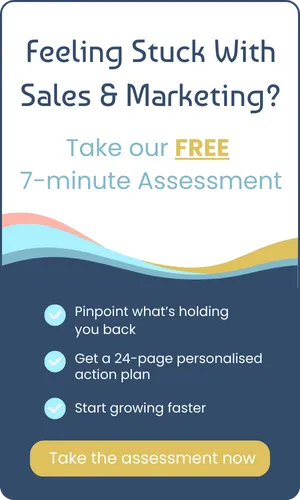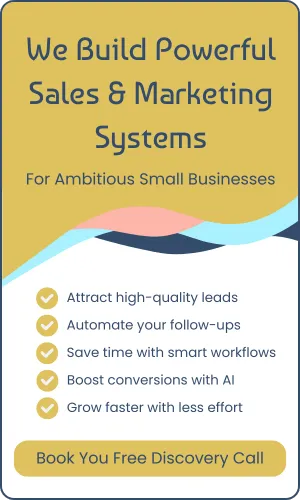From Awareness to Purchase: Understanding Sales Funnels and How They Can Skyrocket Your Sales
Are you struggling to convert your website visitors into paying customers?
A sales funnel might just be the missing piece of the puzzle.
A sales funnel is a framework that outlines the customer journey from the first point of contact with your brand, to the final purchase decision. It breaks down the different stages that a consumer goes through, from becoming aware of your product or service, to actually making a purchase.
By understanding sales funnels, you can identify potential pain points and optimise your marketing strategies, to guide customers seamlessly through each stage. Whether you're a small business owner or an online entrepreneur, mastering sales funnels will give you a competitive edge and help you maximise your revenue.
In this article, we'll delve into the various stages of the sales funnel and provide practical tips on how to effectively move prospects through each step. Discover how to harness the power of the sales funnel and supercharge your sales today.
Let's Start By Understanding The Different Stages of a Sales Funnel
Sales funnels consists of three main stages:
Awareness
Consideration, and
Decision
Each stage represents a different level of engagement and intent from the customer. Let's take a closer look at each stage and the strategies you can employ to move prospects through the funnel.
Top of the Funnel: Awareness
At the top of the funnel, your goal is to generate awareness and attract potential customers. This is where you cast a wide net and reach out to a broad audience who may, or may not, be familiar with your brand or the problem your product or service solves. The key here is to create valuable content that educates and entertains while subtly introducing your brand.
We've talked about, and gone into detail on a wide range of awareness marketing strategies in other posts. For the purpose of this post the core central pillar is the publishing of high-quality content in the form of blog posts or videos, which are then broadcast out via email, social media, and any paid marketing channels you may choose. Additionally, leveraging search engine optimisation (SEO) techniques can help your content rank highly in search engine results, increasing its visibility further.
To optimise the top of the funnel, it's essential to track the performance of your awareness campaigns. Utilise analytics tools to monitor website traffic, social media engagement, and the number of leads generated. This data will help you refine your strategies and identify opportunities for improvement.
Middle of the Funnel: Consideration
Once you've captured the attention of prospects, it's time to nurture their interest and move them to the middle of the funnel. At this stage, prospects are actively considering your product or service, comparing options, and evaluating their needs.
To effectively guide prospects through the consideration stage, you must provide them with valuable information that addresses their pain points, and showcases the unique value your offering brings. This can be in the form of detailed product descriptions, customer testimonials, case studies, or comparison guides.
Email, SMS and WhatsApp marketing are powerful tools for nurturing leads in the middle of the funnel. By segmenting your list based on interests or behaviour, you can deliver targeted content that resonates with each prospect. Personalised campaigns can include curated content, special offers, or even personalised recommendations based on the prospect's browsing or purchase history.
Additionally, offering free trials, demos, or consultations can help prospects experience the value of your product firsthand. By removing barriers and providing a taste of what you offer, you increase the chances of converting leads into paying customers.
To optimise the consideration stage, analyse the performance of your nurturing efforts. Track message open rates, click-through rates, and conversion rates to gain insights into what resonates with your audience. A/B split testing tools, which randomly divide and distribute your audience into two different campaigns can also help you fine-tune your messaging and optimise your conversion rates.
Bottom of the Funnel: Decision
The bottom of the funnel is where prospects make their final purchasing decision. At this stage, it's crucial to provide all the information and support necessary to help prospects feel confident in their decision.
The single most effective strategy for the decision stage is to offer incentives or limited-time promotions. This creates a sense of urgency and push prospects towards making a purchase. Free shipping, discounts, or exclusive bonuses can be powerful motivators to seal the deal.
Another tactic is to leverage social proof. Showcase customer testimonials, reviews, or case studies that highlight the positive experiences of previous customers. This builds trust and reassures prospects that they are making the right choice.
To optimise the decision stage, it's wise to closely monitor your conversion rates and identify any barriers, or friction points, that may discourage prospects from completing their purchase. Streamlining the checkout process so it includes as fewer clicks as possible, offering multiple payment options, and providing clear and transparent pricing is all best practice for removing any potential obstacles.

Optimising Your Sales Funnel
Now that we've explored the different stages of a sales funnel, let's discuss some practical tips for optimising your funnel and maximising your sales potential.
Tools and Techniques for Tracking and Analysing Your Sales Funnel
To optimise your sales funnel effectively, it's crucial to track and analyse key metrics at every stage. Gaining clear insights into how prospects move through your funnel allows you to spot bottlenecks, refine your approach, and ultimately increase conversions.
At the heart of any successful system is a reliable Customer Relationship Management (CRM) platform. A good CRM helps you manage leads, track customer interactions, and measure the effectiveness of your marketing activities, giving you a centralised view of your entire sales and marketing process.
In addition to a CRM, web analytics tools like Google Analytics offer valuable insights into website traffic, user behaviour, and conversion rates. By combining CRM data with website analytics, you can build a comprehensive understanding of your prospects’ journey, identify patterns, and make informed decisions to strengthen your funnel.
Of course, managing multiple systems can quickly become overwhelming, which is why many businesses now look for an integrated solution that brings everything together. A platform like Samai combines CRM, marketing automation, AI-driven insights, and analytics - all in one place - making it easier than ever to track, optimise, and grow your sales funnel without the stress of juggling multiple tools.
Case Studies of Successful Sales Funnels
Learning from real-life examples can provide valuable insights and inspiration for building your own successful sales funnel. Studying your several of your top competitors sales funnels can help you identify best practices and strategies that can help you stand out and achieve your goals.
Additionally, look for case studies from companies outside of your industry. Analyse their funnel structure, content strategy, and conversion tactics. Identify what sets them apart and try to apply those learnings to your own funnel. Larger companies have often already spent many hours, and invested thousands, in optimising their sales funnels so why not take inspiration from their learning.
Just remember one thing though... this is about taking inspiration and creating your own version, not copying!

Common Mistakes to Avoid in Building a Sales Funnel
Building an effective sales funnel requires careful planning and execution. However, there are common mistakes that businesses often make that can hinder their success. By being aware of these pitfalls, you can avoid them and optimise your funnel for better results.
One common mistake is neglecting the top of the funnel. Focusing solely on the decision stage can lead to a lack of new leads and a limited customer base. Remember to allocate resources and strategies to attract and capture the attention of potential customers.
Another mistake is having a disconnected funnel. Ensure that each stage of your sales funnel flows seamlessly into the next, providing a cohesive and personalised experience for prospects. Disjointed messaging, or inconsistent branding will confuse and discourage potential customers.
And finally, failing to nurture leads in the middle of the funnel will result in missed conversion opportunities. Keep your leads engaged by regularly delivering relevant content and personalised communication that addresses their needs and concerns.
Implementing a Sales Funnel for Your Business
How Samai Can Help
Building and optimising an effective sales funnel can feel overwhelming, especially when you're juggling multiple tools, platforms, and strategies just to keep things moving.
That's where Samai makes all the difference.
Samai brings everything you need together into one simple, powerful platform:
A built-in CRM to manage leads and customer interactions effortlessly
AI-powered marketing automation to nurture prospects at every stage of the funnel
Powerful analytics to track, measure, and optimise your funnel performance
Integrated email, SMS, WhatsApp marketing, landing pages, forms, and more all connected and working together
There's no more stitching together disconnected systems. No more guesswork about what's working and what’s not. Just one streamlined platform designed to help you attract, nurture, and convert more leads with less effort.
Whether you're just starting to build your first sales funnel or you're ready to refine and scale your existing process, Samai gives you the tools and support you need to grow smarter, and faster.
If you're even mildly curious about building a sales funnel for your business it might be worth reaching out to us and booking time for a chat and demo.





